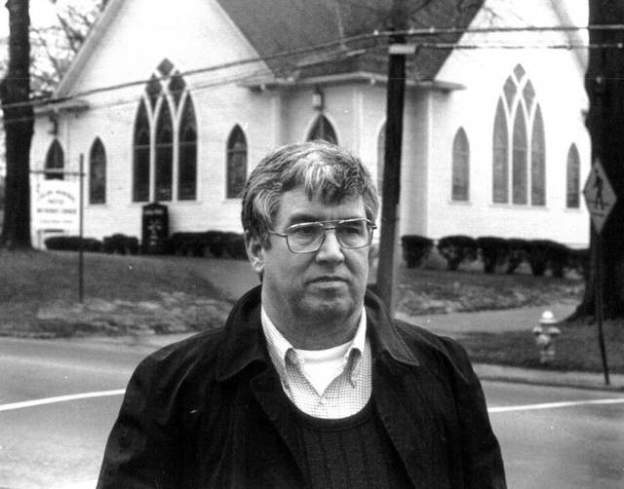“Are you Billy’s son?”
It was always the first question. I had joined the Detroit News, nemesis of my dad’s paper, the Free Press, just down Lafayette Boulevard.
Whenever I introduced myself, that was the response. I learned to answer diplomatically.
“That depends,” I’d say. “What did he do to you?”
There was no middle ground with dad, just as there was no middle ground in him.
If you were a reader or reporter, you probably loved him. I’d hear stories about how fellow journalists used dad as a reference desk, borrowing his notebooks — every page page of every notepad numbered and indexed in handwriting as legible as his Underwood. They say he’d dive into an impossibly high mountain of notebooks, only to emerge with the one you needed on what Coleman Young said outside Cobo Hall in ‘72.
There was the family of Shannon Mohr, who wrote dad yearly after he nabbed Shannon’s killer, David Davis, in a piece that left Davis in prison to this day.
If you were an editor, bureaucrat or privileged, you likely had a different impression. Dad believed he never got to the New York Times because of a confrontation with Sen. Ernest Hollings from South Carolina, who made the mistake of wavering in an interview with dad about getting out of the Vietnam War. When Hollings called a hasty press conference to deny the statement, dad showed up — with his notepad. He called Hollings a liar from the press pit. “Well I’ll be goddamned if I’ll have a reporter call me a liar at my own press conference,” Hollings snapped. “I’ll knock your block off.” Dad rushed the stage, was ushered out by security and made the wires, a story I still have.
Editors didn’t fare much better. As a boy, I once stumbled upon a letter, typed on his Underwood, to his boss for grievous editing changes. Tops on the list: using the word “alleged,” a term dad found wishy-washy. “For instance,” the letter said. “I would never say (insert editor here) is an alleged ignoramus.” It got angrier from there, with references to criminal ineptitude, souls for sale and relations with your mother that were above the grasp of a pre-teen. But I do not use the word alleged.
If you lived at home with him, you got a bit of both worlds. Once dad showed up at a little league football trophy ceremony with a cast: he’d broken his hand after punching a wall when editors refused to run a story he had cold. I was too embarrassed to realize I had the coolest dad in the room.
Dad organized the house like his notebooks. Our basement shelves run the length of the house, and dad put a letter on every one: A, B, C, etc. If you found a ball, you put in on the “B” shelf.
He also created a system of index cards and cabinet shelves, also labeled: A-2, B-5, J-12. If you needed a Phillips head screw, you’d look up Phillips screw, discover it was in cubby C-21, and there’s your screw. At the time I never appreciated it. I assumed all of dad’s screws were loose anyway.
I was convinced when my sister Caroline called once, flabbergasted, after she, mom and dad went to the Hartsfield Airport, one of his least favorite places on earth. Caroline said dad paid the parking ticket to exit the lot, but didn’t pull out before the gate lowered again. When he asked the attendant to re-raise the gate, she said that she was allowed one lift per customer, and she’d need to call a supervisor. After some choice words, dad got out of the car, snapped the gate off, stood it against the attendant station and drove off. No one bothered dad for reimbursement.
Dad never pressured me into getting into the newspaper business, though his confrontations should have dissuaded me. He would tell Caroline and me that didn’t care what we pursued, what our G.P.A. was, as long as we received solid grades for effort.
But watching him work, I saw dad utterly happy. He wouldn’t come home for 36 hours straight when he was working a big story, and he’d collapse on the couch in his boxers for two days when he was home.
But it was his calling. “I couldn’t do another thing,” he would say. “It’s the one job I can tell anyone to go to hell.”
The longer I spent in Detroit, the more I realized the cast of his shadow, the reputation he’d never mention to us. I gave up the notion of eclipsing my father, which perhaps brought me to Detroit. Following his vapor trail would be hard enough.
I went home a few years ago and found my father’s Underwood in the basement, in the “T” shelves. I wanted to make a tattoo of the home row, and pecked it out on a piece of paper. First all caps, then all lower-case. I wasn’t sure which one to put on my forearm, then remembered: dad preached understatement.
Not that he was impressed with my decision. He thought I’d look like a thug. Besides, he said, he wasn’t one for decoration. Particularly permanent ones.
But that’s ok. I burned it anyway. I’m no longer diplomatic in my answers.
“Yeah, I’m Billy’s son.”

